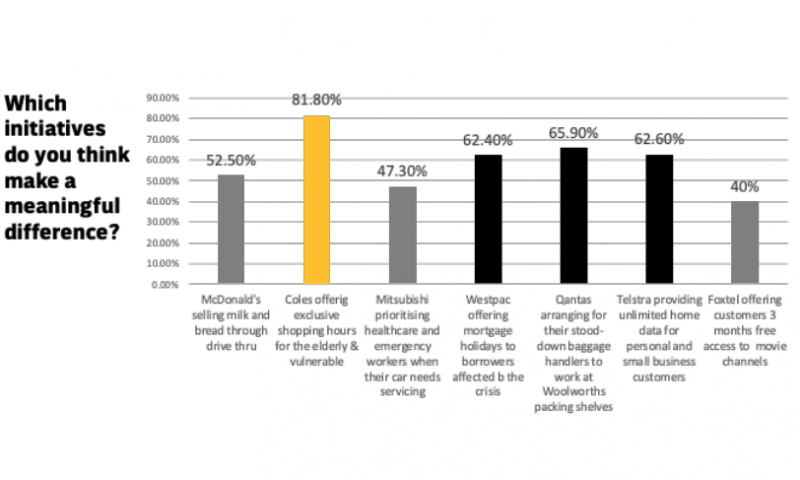Coles’ community hour named best brand initiative by consumers during COVID-19
The COVID-19 brand initiative that won the most approval from Australian consumers is Coles’ community shopping hour to help the elderly and vulnerable access groceries.
Research commissioned by DDB and performed by Pureprofile on which COVID-19 initiatives were best received by consumers found Foxtel’s offer of three months of free access to its movie channels was considered to be the least meaningful.



Is it worth mentioning in this article that Coles is a DDB client? And haven’t Mcdonalds, Foxtel, Westpac and Qantas also been clients?
Hi Matthew,
Very good point and an oversight on our part. We will update the story to reflect the relationship.
Thanks,
Hannah – Mumbrella
It may also be worth mentioning that Woolworths came up with and launched the elderly shopping hour initiative, and Coles followed suit.
To be fair, Iceland in the UK came up with it and implemented it a long time before Coles and Woolies copied them, so probably not worth arguing who did it first, but instead asking was it effective – the answer by the look of it is yes.
To be fair – Iceland introduced the hour on March 17 – and the UK is eight hours behind Australia so it looks like they copied it from Woolies.
Strange how this is praising Coles for the shopping hour initiative, when Woolworths came up with the idea and launched it first?
Spot on Rhys. Woolies was the first to come up with the idea and Coles quickly copied it. Woolies introduced the special hour on March 17 and Coles on March 18. Mind you, DDB Group have Coles as a client so the survey needed to rewrite history. Very 1984 in 2020.
“Good Things are Happening at Coles”?
More like “Good Ideas are being Copied at Coles”
I believe the praise lies with sainsburys in the uk
Any PR agency of merit would know not to pitch research blatantly just lauding their own client in this way, but that’s exactly what creative agency DDB has done as part of their new relationship with Coles.
I call BS on the research and that this has even run as an article
Lisa Wilkinson came up with this idea – is that correct? Then the shops adopted it….
I don’t believe this was her idea. I’d seen people mention this on Twitter a good few days before Lisa Wilkinson mentioned it. However, she certainly provided a forum & voice for this, and I do believe this probably did influence Woolworths, and then Coles.
Laughable though that Coles is being praised for an initiative that they copied/followed.
Mumbrella this is very sloppy.
DDB isn’t this a little embarrassing? How did Woolworth’s rank running the same initiative?
Sample size & methodology would of been good to understand quality of the research.
Yes – 100% correct! Lisa W came up with the idea first, then the shops adopted it. Please give credit, where credit is due.
Firstly, a man that owns an IAG came up with the idea and WW followed him and then Coles followed WW.
Secondly, this research should read “of DDB clients which initiative scores the best”
This research does not pass a basic “sniff” test. I am surprised Mumbrella ran this story.
Those stating Coles copied it from WW should note it was done by Iceland in the UK before both
However I don’t believe Iceland’s agency ran a very dubious ‘research’ project to pat themselves on the back
OK – let’s end the discussion of who came up with the idea first. It was Woolworths in St Ives.
I was there in 1993 at 7am and everyone in the store was over the age of 80 and there was a run on the Schwarzkopf blue hair colouring.